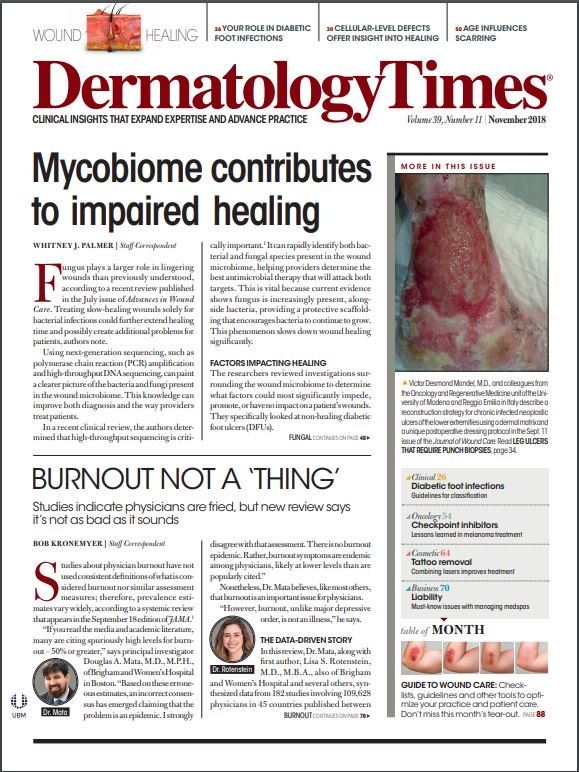- Acne
- Actinic Keratosis
- Aesthetics
- Alopecia
- Atopic Dermatitis
- Buy-and-Bill
- COVID-19
- Case-Based Roundtable
- Chronic Hand Eczema
- Chronic Spontaneous Urticaria
- Drug Watch
- Eczema
- General Dermatology
- Hidradenitis Suppurativa
- Melasma
- NP and PA
- Pediatric Dermatology
- Pigmentary Disorders
- Practice Management
- Precision Medicine and Biologics
- Prurigo Nodularis
- Psoriasis
- Psoriatic Arthritis
- Rare Disease
- Rosacea
- Skin Cancer
- Vitiligo
- Wound Care
Publication
Article
Dermatology Times
Why FDA approval of cosmetics may be unnecessary
Author(s):
Some believe that all skincare products should be approved by the FDA, but is the regulation of cosmetics really necessary?
Some believe that all skincare products should be approved by the FDA, but is the regulation of cosmetics really necessary? (dusanpetkovic1 - stock.adobe.com)

Should eye shadow be approved by the US Food and Drug Administration? At first glance this question may evoke laughter; however, this question is being debated between regulatory authorities and the cosmetics industry.
There is a movement contending that all cosmetics, skincare products and cleansers should be regulated to protect the health and well being of consumers. Regulation has done much to eliminate mercury-containing skin lightening creams and the ingestion of oral arsenic to achieve pale skin. These are clearly toxic substances used for an appearance related benefit with profound risks.
We are accustomed to the close regulation of pharmaceuticals. There are clearly defined testing methodologies and regulatory milestones that must be achieved prior to approval of a new drug. The steps involve first assessing the safety of a given compound, second evaluating the most effective minimal dose, and finally determining if certain efficacy goals are reached.
Pharmaceuticals are different than cosmetics in that they must be purchased with a prescription and used under the direction of a skilled physician. There are no prescription cosmetics and they are purchased in the mass market without any professional direction.
Is regulation of cosmetics necessary? This is a question worth considering in dermatology, since we are the only area of medicine where so many mass products can be purchased that affect the health of the skin, hair and nails.
Indeed, there are a variety of skin and hair care products that are considered over-the-counter drugs. These include acne washes containing benzoyl peroxide or salicylic acid, dandruff shampoos containing zinc pyrithione, and antibacterial cleansers containing benzalkonium chloride. These products contain ingredients that are listed on monographs specifying which ingredients can be used, in which combination, with which concentration, and associated with which claims.
The monograph system has been very effective in allowing the cosmetics industry to create useful consumer products that address common health issues without having to pursue the long and expensive pharmaceutical approval path. This provides medical assistance for mild acne, dandruff, and infection control at an affordable price.
Cosmetics have not been regulated in the past, as they possess substances that only adorn and scent the skin, but both ingredient technology and skin physiology insights have advanced to provide higher efficacy beyond just adornment.
Cleansers were intentionally left without regulation by the federal government as concerns arose in the 1930s that regulation would lead to price increases and reduced ability to purchase cleansers resulting in lower hygiene standards among Americans.
Clean water and cleansers are, in my opinion, the most profound invention of mankind, although others would argue the cell phone is more important. I would argue that it is hard to focus on a cell phone when you are infected with salmonella or shigella. Nevertheless, cleansers are not regulated and there have been few issues with bland soaps and syndets after many years of use.
The push to regulate the cosmetics industry would be based on the introduction of new ingredients.
One proposal allows all old ingredients to be grandfathered in as approved, the same concept used for all existing pharmaceuticals that were sold when the FDA was created, and only new ingredients would need to go through an IND-type approval process.
The cosmetics industry thrives on new ingredients. Think of the revolution in skin and hair care created by all of the new silicone derivatives that allow superior moisturization without a greasy, sticky film. If new ingredients required approval, it would lead to less innovation, poorer product formulations, longer wait times for new technology, and increased expense. When was the last time you heard someone was poisoned by hand cream? Would the regulation address a problem that exists in the current marketplace?
I can tell you after designing and executing studies with the cosmetics industry for 30 years, the research conducted is extensive. Cosmetic chemists develop carefully designed formulations. Raw materials are assessed for safety and purity. Products and packaging are tested for long term stability on the shelf and after consumer opening. Repeat insult patch testing and 21-day cumulative irritancy testing is performed on finish formulations to insure the absence of irritant and allergic contact dermatitis. Use testing is conducted to insure both safety and efficacy and claim substantiation in normal human use.
Because company reputations are on the line, testing is conducted to be sure problems do not occur and the system appears to be working. How many years have passed since a major cosmetic industry health issue arose in the United States?
I think safety regulation has done much to improve consumer health in the United States. It has set a high bar and an organizational structure for all industries that are not regulated. While it is true that all aspects of life in the United States could be regulated, I am not sure regulation of the cosmetics industry would improve product safety in an environment where there are no present issues.
Many cosmetic products, such as hand moisturizers and body lotions, have reduced the incidence of eczematous dermatoses in a more profound way than pharmaceuticals based on the number of units sold. The federal government already regulates the coloring agents used in cosmetics. Do we need FDA approved eye shadow?

Newsletter
Like what you’re reading? Subscribe to Dermatology Times for weekly updates on therapies, innovations, and real-world practice tips.



























